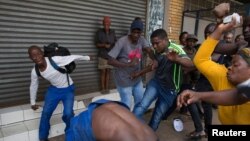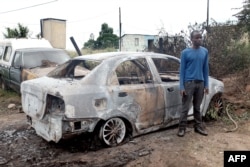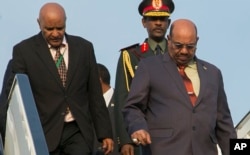During the Nairobi launch of Amnesty International’s annual global report, Muthoni Wanyeki, the group’s regional director for East Africa, the Horn, and the Great Lakes, said there has been a “backtracking” in global human rights, giving examples from some of the 11 countries she monitored.
“Obviously, none of us would deny that we’re seeing a growing or higher-than-usual intolerance of dissent, whether we’re talking about the hardening of positions in Burundi, Eritrea, Ethiopia, under the state of emergency, Kenya even in terms of sort of the more informal attacks on human rights defenders, South Sudan, the mass detentions there, Sudan, and Tanzania,” said Wanyeki.
Growing authoritarianism, conflict, increased crackdowns on free protests, political tensions and repression, and xenophobia are just some of the threats to human rights in Africa, according to Amnesty.
Wanyeki says the fragility of some African states is especially worrisome, as some leaders try to hold on to power.
“Not too long ago, we were celebrating the end of many conflicts within Africa. We’re now at the 10-year period, the transition period, so the two constitutional terms of five years, and what are we seeing? No transition. We’re seeing attempts to change things, etcetera, and is 10 years really enough to deal with all the grievances, all the feelings of exclusion, that brought that conflict about?”
Steve Cockburn, Amnesty International’s deputy regional director for West and Central Africa, said that in every country where his team conducted research, there were banned protests, demonstrators who had been arrested, and even eight or nine who were killed.
“So I think we’re seeing a growing crackdown on free protests,” said Cockburn. “And I think the other kind of major trend we have is in the spread of conflict across the region. So civilians have been killed in countries around Lake Chad, regions around Boko Haram, around the Sahel, in Central African Republic, but also in areas we didn’t used to see.”
With respect to South Africa, Wanyeki argued the country should be leading the way in human rights, but has fallen short.
“The political tensions, the xenophobia toward migrant workers, toward asylum seekers is of great concern because basically it is losing its moral authority to provide leadership on the continent,” said Wanyeki.
Activist Boniface Mwangi attended the Nairobi launch, paying special attention to the Kenyan report, which discussed the extrajudicial killings of a lawyer, his client and their driver in June, and violations by security agencies during counterterrorism operations, among other issues.
“But I think we need to go beyond reporting, that’s my call,” said Mwangi. “We need to do more than this. Amnesty’s doing a fantastic job, but what can we do to ensure that people don’t just die and become a statistic for next year’s report?”
Amnesty says there are some success stories from the continent. Chad’s former president and the former DRC vice president were convicted of war crimes and crimes against humanity, South Africa’s Supreme Court criticized the government for allowing Sudan’s president, who has a warrant out for his arrest, to leave the country after a 2015 visit, and Kenya’s high court struck down the government’s decision to close the Dadaab refugee camp.






